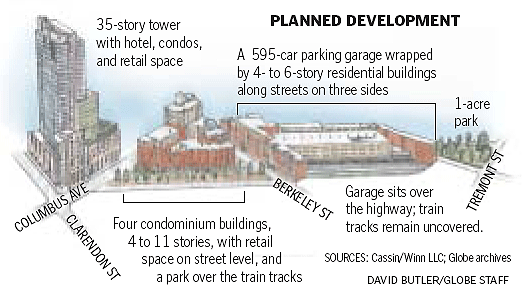$10m more sought for Columbus Center
By Thomas C. Palmer Jr., Globe Staff | July 13, 2007
The developers of the Columbus Center project in Boston, already under fire for a $10 million state grant to help with site preparation, are pushing for another $10 million from the Patrick administration.
And, despite criticism from some Democrats in the Massachusetts House , city and state officials appear supportive of the additional infusion of public funds.
Developers Arthur Winn and Roger Cassin originally requested $20 million in state aid for the project to help build the concrete platform over the Massachusetts Turnpike on which parts of the complex would sit. Last month the Patrick administration awarded the developers $10 million. At the time, the administration did not address the request for the other $10 million.
The Legislature has repeatedly declined to provide state development funds for Columbus Center; the funds awarded to the developers last month did not require legislative approval.
Legislative opponents renewed their attacks on the use of public funds for private development yesterday. "This is not an appropriate use of the job creation funds that the Legislature set aside in the economic stimulus package," Representative Martha M. Walz, a Back Bay Democrat who criticized the award of the first $10 million, said yesterday.
Winn and Cassin have also asked a city development agency to issue $32.5 million in tax-free Empowerment Zone bonds, which they would repay.
Boston officials, frustrated at watching Columbus Center sit on the drawing board for four years after it received city approval, this week said the project deserves the additional money. In addition, the Menino administration supports the use of the Empowerment Zone bonds for Columbus Center.
"It's our sense that these public monies are the only way this project is going to get off the ground," said Harry Collings, executive secretary of the Boston Redevelopment Authority. "We feel the benefits far outweigh the public money's participation."
Winn and Cassin calculate that they will contribute a total of about $53 million in public benefits and construction mitigation measures, including three parks and future park maintenance, 45 affordable housing units on site, 20 or so affordable units off site, recharging of groundwater wells in the area, and subsidies to future occupants including a day-care center and grocery store. The project itself will generate 2,600 construction jobs and 380 permanent ones.
The developers estimate the project will have received a total of $59.6 million from a variety of public financing sources, including loans, grants, and the value of the city bonds -- not counting the additional request of $10 million from the state.
A representative of the Massachusetts Executive Office of Housing and Economic Development, which would have to approve the remaining $10 million request, declined to say yesterday whether the Patrick administration would sign off on the funds, but made clear it strongly supports the Columbus Center project.
"Our goal is to get the shovel in the ground and the project moving forward," said Kofi Jones, a spokeswoman for the agency. A spokesman for Winn and Cassin said yesterday that, after a decade of planning, delays, and long searches for sufficient private and public financing to cover the massive residential, hotel, retail, and open-space development's cost, the additional funds should be enough to get the project started.
The developers also said the total cost is now estimated at $800 million -- up from an estimated $300 million six years ago.
Critics of the project again insisted that the developers had pledged in some of the 100-plus public hearings over the years not to seek public funding.
"Public subsidies paying for public benefits through a private entity that makes a profit doesn't make a lot of sense to me," David S. Mundel, a South End resident and opponent of Columbus Center, said yesterday. "Do we really want the project, given what they expect us to pay for it, or could we do better?"
Winn and Cassin have repeatedly denied they made any pledge to forgo public funds. In fact, they have argued that public financing was always contemplated on projects built on air rights of the turnpike corridor.
They cited "A Civic Vision for Turnpike Air Rights in Boston," a 2000 document published by the Boston Redevelopment Authority that set guidelines for design and development of projects over the turnpike in the city.
The concrete platform that would be funded in part by the state assistance is crucial to making those turnpike air rights available for the Columbus Center development.
"Air rights can help achieve longstanding urban design and public realm goals," the document states. "Meeting these goals will require an aggressive effort to obtain public and private funds."
Collings, who followed the permitting and review process closely, said this week he had reviewed the history and spoken with others who attended the meetings.
"There's no recollection a guarantee was made," he said. "There may have been a mention that 'at this time it isn't anticipated' there would be public funding. But there was never any anticipation that costs would spiral the way they have since."
When Winn and Cassin were designated as the developers of the air-rights space by the Massachusetts Turnpike Authority in 1997, Columbus Center's cost was pegged at about $300 million. But the costs of steel and other construction materials have escalated by up to 20 percent a year.

